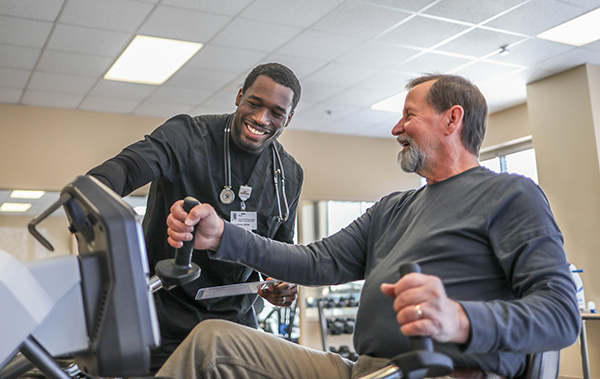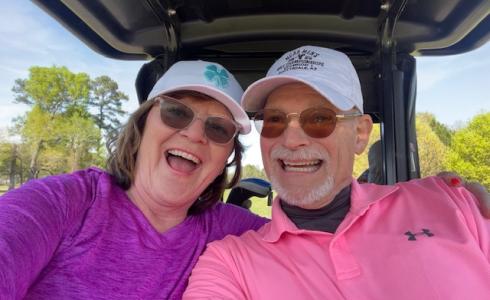Overview
The University of Tennessee Medical Center designs its Cardiovascular and Pulmonary rehabilitation programs to help people with cardiac, vascular and lung problems recover faster and improve their quality of life. Located conveniently in Knoxville, Tennessee, our experienced and trained team create a customized rehabilitation schedule that fits your needs.

All three programs include exercise, education, counseling and support for patients and their families. The rehabilitation team consists of the patient, the family, physician, registered nurse, exercise physiologist, dietitian, respiratory therapist, psychologist, and pharmacist.
Using the team approach, patients are involved in setting goals and building an individualized treatment plan. With this individualized treatment plan, the rehab team will deliver progressive exercise and tailored education to control risk factors, increase strength and independence, and improve quality of life. Rehabilitation documentation with clinical progress notes are sent routinely to the patient’s medical team for review.
Cardiac Rehabilitation
Almost anyone with heart trouble can benefit from Cardiac Rehabilitation. Some common heart problems include heart attack, angina, heart failure, angioplasty, coronary stent, and coronary bypass surgery. Cardiac Rehabilitation is a safe and effective way to help you feel better faster, get stronger, reduce stress, reduce your risk of future heart problems, and live longer. No one is too young or too old. Women and men benefit equally from Cardiac Rehabilitation.
Telehealth Appointments
When possible, The University of Tennessee Medical Center physician patients can now be seen while at home through telehealth phone and video visits. Telehealth appointments make it easy to access the care you trust by using your existing smartphone, tablet, or computer. Learn More
Cardiac Rehabilitation has two major components: exercise training and education/counseling. Exercise training strengthens muscles, improves stamina, and teaches the patient how to exercise safely. Education/counseling provides information about heart conditions and ways to reduce the risk of future heart problems. Cardiac rehab usually occurs in groups, but each patient’s plan is based on the individual’s specific risk factors and special needs.
Phase I: Cardiac rehab begins in the hospital with Phase I, which includes education and early mobility. This phase of rehab is for patients admitted to the hospital with heart problems, such as those who have undergone heart surgery or have had a heart attack and includes guidelines for continued home exercise and coordination of outpatient cardiovascular and pulmonary rehabilitation if indicated. Phase II: This phase occurs in the outpatient setting soon after discharge from the hospital. This phase includes closely supervised, clinically monitored group exercise sessions, led by the rehab team, and directly supervised by a physician. The education and counseling are individualized to the patient’s risk factors and private education appointments are available with the rehab staff for specific needs. Phase II is offered three days per week, up to twelve weeks. Phase III: This phase is a maintenance exercise program offered within the rehabilitation gym facility. This is a non-clinical and independent exercise program, available to patients after the completion of Phase II. The Phase III program is self-pay, like a gym membership, and is made to promote maintenance exercise for long-term health.
Hybrid Cardiac Rehab
We suggest you attend 12 to 36 visits of the in-person program. We know that there may be barriers to taking part in the in-person program. If this is true for you, please think about joining our Hybrid Cardiac Rehab program. This program combines the personalized care of our in-person program with the flexibility of our Telehealth visits. Please call us to talk more about this program.
Pulmonary Rehabilitation
Almost anyone with lung problems can benefit from pulmonary rehab. Some common lung problems include patients with Pulmonary Fibrosis, Chronic Obstructive Pulmonary Disease (COPD), chronic bronchitis, emphysema, asthma, lung surgery, and some patients after COVID-19. Pulmonary rehab is a safe and effective way to help the participant feel better faster, get stronger, reduce stress, and improve the overall quality of life.
Pulmonary rehab has two major components: exercise training and education/counseling. Exercise training strengthens muscles, improves stamina, and teaches the patient how to exercise safely with less breathing effort. Education/counseling provides information about lung conditions and ways to reduce the risk of future lung problems. The rehab team teaches the patient how to cope with lung problems and how to deal with fears about the future. Pulmonary rehab usually occurs in small groups, but each patient’s plan is based on the individual’s specific needs.
Phase I: Pulmonary rehab begins in the hospital with Phase I, which includes education and early mobility. This phase of rehab is for patients admitted to the hospital with lung problems and includes guidelines for continued home exercise and coordination of outpatient pulmonary rehabilitation if indicated. Phase II: This phase occurs in the outpatient setting and includes closely supervised, clinically monitored small group exercise sessions directly supervised by a physician. The education and counseling are delivered as pulmonary diagnosis management education, breathing exercise training, pulmonary disease risk factor identification, and oxygen prescription recommendations. Phase II is offered two or more days per week, up to nine weeks. Phase III: This phase is a maintenance exercise program offered within the rehabilitation gym facility. This is a non-clinical and independent exercise program, available to patients after the completion of Phase II. The Phase III program is self-pay, like a gym membership, and is made to promote maintenance exercise for long-term health.
Vascular Rehabilitation
If you have been diagnosed with peripheral arterial disease (PAD), vascular rehabilitation can help improve your quality of life.
PAD stands for Peripheral Arterial Disease. PAD often occurs in your legs and is caused by a buildup of plaque in your arteries. Plaque is a blend of fat and other substances like cholesterol. This build-up leads to a narrowing, and in some cases blockage of the arteries. This results in decreased blood flow to your legs and can cause cramping, pain, or weakness when you walk. This cramping is called intermittent claudication.
Vascular Rehabilitation is an exercise and education program designed for patients with PAD to increase pain-free walking time and distance. This program is often called Supervised Exercise Therapy for PAD or SET-PAD. The Vascular Rehab program is offered three days per week for 36 visits over a maximum of 12 weeks.
Vascular Rehabilitation is offered in the outpatient setting within the Cardiac Rehabilitation program. Exercise training strengthens muscles, improves stamina, and teaches the patient how to exercise safely. Education/counseling provides information about health conditions and ways to reduce the risk of future health problems. Vascular Rehabilitation usually occurs in groups, but each patient’s plan is based on the individual’s specific risk factors and special needs. Phase III is a maintenance exercise program offered within the rehabilitation gym facility. This is a non-clinical and independent exercise program, available to patients after the completion of Phase II. The Phase III program is self-pay, like a gym membership, and is made to promote maintenance exercise for long-term health.
Patient Resources
Heart Disease Home Walking Program
Pulmonary Disease Home Walking Program
Phases of Cardiovascular and Pulmonary Rehabilitation
Vascular Rehabilitation Brochure
Cardiovascular Rehabilitation Tip Sheet
Pulmonary Rehabilitation Tip Sheet
Cardiovascular Rehabilitation Goal Sheet
Pulmonary Rehabilitation Goal Sheet

